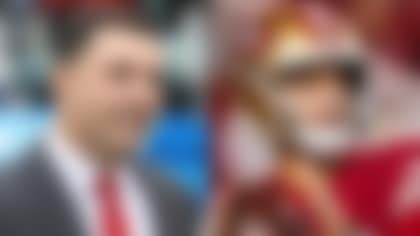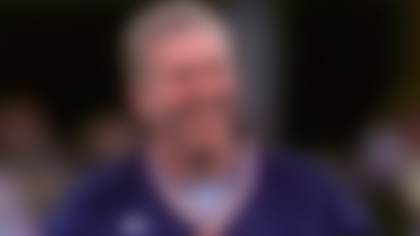I can't remember whether I first heard or read the news that Chuck Pagano had acute promyelocytic leukemia (APML). I do remember being shocked. I remember emailing my boss Brian Lockhart that I'd like to be assigned the story when the time came. I wanted to talk to the coach. For some reason, I felt it should be my responsibility.
I'd never met Pagano, but I certainly knew of him. Growing up in Colorado, I learned in high school that the name Pagano was synonymous with football. It started with his dad. We all knew of Sam Pagano, whose Boulder Fairview High School teams were always in the mix for a state championship. His sons Chuck and John were good enough to play in college as the former went to Wyoming where he played with a guy who would become a good friend to both of us named Joe Ramunno, another Italian whose father was a high school coach. John Pagano later played at then-Mesa State College in my hometown of Grand Junction, before Ramunno coached those Division II Mavericks 14 years while following Chuck's journey through the ranks. I'd never met Chuck Pagano, but I knew a lot about him.
Through October it was clear there would be no opportunities to interview Pagano. His treatment of the leukemia began with almost a month-long stay and chemotherapy at IU Health Simon Cancer Center in Indianapolis. Through Dr. Larry Cripe, we all learned there would be two more rounds of chemo after Pagano was released on Oct. 21.
When he visited the Colts' facility eight days later, I thought, for the first time, that he might actually make it back to coach this season. And when we all saw his inspirational speech to the Colts following their 19-13 win over the Miami Dolphins on Nov. 4, how could any of us doubt his resolve, his vision? He might have looked like a patient with less hair and weight, but he sounded like a coach. The next day Dr. Cripe announced that Pagano was in remission. I boarded a plane bound for Indianapolis that afternoon.
We'd decided to talk with the Colts about Pagano and how he'd continued to coach them through texts, emails and phone calls. We'd heard about this for a few weeks, and I'd even pitched the idea to my bosses that we could "interview" him via email. I sent him an introductory note and interview request in late October, not knowing for certain that the email address I had was the one he used. It went unanswered.
Producer Pat Becher and I came away from our interviews with Dwight Freeney, Cory Redding, Reggie Wayne, Robert Mathis and interim coach Bruce Arians excited about the way they described their relationships with Pagano and how he'd coached them from afar. I was impressed with each of these players, and thought I'd send another email saying just that to the coach. "Why not?" I thought. I had nothing else to do on a layover in Atlanta's Hartsfield-Jackson International Airport. I only wished I'd had another email address that he might actually see.
Three minutes later, Chuck Pagano replied.
Over the next several weeks, I might have sent four or five emails congratulating or encouraging him, mostly saying "way to go." He replied each time, signing each note "-cp."
And then, on Christmas Eve, Chuck was back on the job. Though he did a live, lengthy interview with Steve Mariucci on our network that week, I selfishly, still, wanted to tell his story. However, with the time demands of an NFL head coach being so great, let alone one who'd missed the last 12 weeks, the likelihood of getting a one-on-one interview with two or three cameras and complex lighting waned.
Hilary Guy was working on a different story. A producer at NFL Network, Hilary had been coordinating a shoot with Abby Gras in public relations at Indiana University Health, home to the IU Health Simon Cancer Center. Hilary had learned about the way Pagano had inspired other patients in the hematology oncology unit at Simon and wanted to tell their stories. She asked if I wanted to be the reporter on the assignment. I suspect she knew the answer before she asked.
On the Sunday Chuck Pagano returned to the sideline for the Colts at Lucas Oil Stadium, Hilary and I -- along with cameramen Brian Clark and Brandon Davis -- spent the day at IU Health Simon Cancer Center. It's less than two miles from the stadium.
We talked with Pagano's doctor and his outpatient coordinator Stacy Dye. We had the privilege of meeting Pete and Bonnie Shininger as Pete prepares to take on leukemia for a third time. And after we talked with Rob and Lindsey Culross who are the parents of 18-month-old twin daughters and a 5-month-old son, we invaded Room B-12 on 3 East of the IU Health Simon Cancer Center, home to Drew and Lyndsey Rariden for the last three weeks. That's where we watched Pagano lead the Colts to victory over Houston. As season ticket holders, it was the first home game Drew and Lyndsey had not seen in person.
Throughout the day it was evident how much inspiration the patients and staff drew from seeing Chuck back on the field. They all know his story. At the stadium the "Chuckstrong" banner is displayed, but in Room B-12, there are "Drewstrong" T-shirts, and on his wrist, Rob wears an orange "Robstrong" bracelet. Pete Shininger actually met Pagano one day. He says the coach has "an aura" about him and that they talked about leukemia, not football, for about five minutes.
I didn't meet Pagano last Sunday, but through these patients and the staff, I felt I better knew his story. His desire to return to coaching was no different from Drew's desire to return to his job as an engineer. Chuck's vision of walking his daughters "down the aisle" is no different from Rob's.
Chuck Pagano held his regularly scheduled news conference last Monday to discuss the game with the Texans and the upcoming playoff game in Baltimore. It wasn't the time or place to ask about leukemia and treatment; Pagano had already addressed those topics in earlier gatherings. As he entered the room, I introduced myself and asked Chuck for "a couple minutes" afterward, and he said yes.
I had just three questions for him, but his compassion and energy left Chuck talking about IU Health Simon Cancer Center, strength and hope for more than three minutes. We had more than we needed for our story; my impressions about the man who so publicly stood up to leukemia were confirmed. I left Indianapolis that night hoping I could do the story justice. Hoping I could accurately reflect what Chuck and Drew, and Pete and Rob are going through. Hoping we could capture their spirit and charm in pictures and words.
I finally shook another Colorado native's hand Monday. It was worth the wait.



